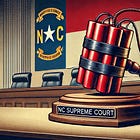What the N.C. Supreme Court should do today about Judge Griffin's case
A one-line decision can put an end to the madness with a minimum of hurt feelings
Update 12:27 p.m. Jan. 7: The Supreme Court did not take my advice. Instead, the court blocked certification of the election results and set dates for briefs to be filed later this month. This likely sets the stage for oral arguments.
It’s really hard to write about court cases because there are so many procedural steps. And every single time one of these steps concludes, there’s a round of news stories about it.
That’s where we find ourselves right now with Judge Jefferson Griffin’s attempt to throw out 60,000 votes from his election for state Supreme Court — and thus win the seat over Justice Allison Riggs. I wrote about this case a few weeks ago, discussing how dangerous this case is for the legitimacy of North Carolina’s judicial system.
This is still true, and it’s even more pertinent today. Yesterday, a federal judge sent the case back to the N.C. Supreme Court to handle the issue (see the ruling here). “Should a federal tribunal resolve such a dispute?” he wrote, and the judge is right. This is a state election, a state issue, and should be handled in North Carolina.
It’s not a huge ruling and was to be expected. But it means that the case back at the N.C. Supreme Court, where the 5-2 Republican majority1 has to make a decision.
The N.C. Supreme Court can and should end this madness today, and with a minimum of hurt feelings. All it takes is a one-line ruling. Here’s exactly how.

